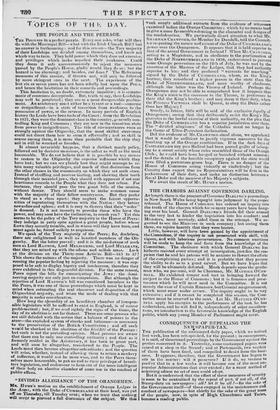TOPICS OV DAY.
THE PEOPLE AND THE PEERAGE.
1"n Peers are in a perfect puzzle. Every one asks, what will they do with the Mnnicipnl Bill—what with the Irish Chute!) Bill ? but no answer is forthcoming : and for this reason— the Tory majority of their Lordships are divided among themselves, and know not which way to turn. They hold power which they dare not exercise, and privileges which make manifest their weakness. Could they deem it safe unceremoniously to reject the measures
passed by the People's House, gladly would they do so; but the azard is too alarming; and besides, cur bond 7 The Reforming measures of this session, if thrown out, will only be followed by more stringent ones in the next. The experience of the lest six or seven years has not been wholly lost upon the Peers, and hence the hesitation in their councils and proceedings.
This hesitation is, no doubt, extremely impolitic ; it is sympto- matic of conscious decrepitude. But, truth to say, their Lordships may well be perplexed ; they are in a most disagreeable predica- ment. An aristocracy must either be a tyrant or a tool—supreme or insignificant—in a state of transition from weakness to the possession -of power, or the reverse. In many periods of English history the Lords have been tools of the Court: from the Revolution to 1831, they were the dominant class in the country, generally con- trolling King and Commons ; they are now in the transition state from power to insignificance. The tide of circumstances runs so strongly against the Oligarchy, that the most skilful steersman could not direct them how to stem it eff‘ectually ; and as skill is scarce among them, it is more than probable that the ship they sail in will be wrecked or founder.
It almost invariably happens, that a distinct manly policy, followed out by decisive measures, is the safest as well as the most honourable. We do not believe that it is possible by any means to restore to the Oligarchy the superior influence which they have lost; but we can see plainly how they might manage to re- tain many valuable privileges, and much of that distinction from the other classes in the community on which they set such store. Instead of' shuffling and proems' inatiug, and showing their teeth through their muzzled jaws, they should with apparent if not real heartiness concede to the People what they dare not refuse. For instance, they should pass the two great bills of the session, without demur. They should seem to make common cause with the majority of their fellow countrymen. But they prefer to stand as a class apart: they neglect the fairest opportu- nities of ingratiating themselves with the Nation : they betray cowardiceand spleen; and it is easy to discern that their "oiler" is doomed. 13 it not insanity to provoke those who have the power, and may soon have the inclination, to crush you? Yet this seems to be the policy of the Tory majority in the House of Peers: they indulge in petty spite against a great people, before whose flown they secretly tremble, and in w hose will they have been, and must again be, forced sulkily to acquiesce.
We speak of the Tory majority of the Peers; for, doubtless, there are enlightened as well as besotted members of the Oli- garchy. But the latter prevail ; and it is the misfortune of such men as Lord RADNOR, Lord MELBOURNE, and Lord MULGRAVE, that they are mixed up with the odious and selfish mass. Look at the division on the Thirty-nine Artic!es Bill-163 to 57! This shows the animus of the majority. There was no danger of rousing the popular feeling by rejecting the measure : it was sup- posed to be safe to display bigotry and intolerance, therefore they mere exhibited in this disgraceful division. For the same reason, Peers reject the bills for emancipating the Jews : the domi- neering majority are only just on cempulsion. But although the rejection of Lord RADNOR'S bill was considered harmless to the the Peers, it was one of those proceedings which must be kept in mind when estimating the real character and disposition of the Oligarchical majority, and when the mode of dealing with that majority is. under consideration.
How long the ajeturdity of an hereditary chamber of irrespon- sible legislators will be suffered to exist in England, is of course problematical ; but, if we read rightly the signs of the times, the day of its abolition is not far distant. There are some persons who are still deluded with the notion that a balance of powers in the
state—the exploded system of checks and balances—is necessary In the preservation of the British Constitution ; and all such would be shocked at the abolition of the ligrsditc of,the Peerage: but such is not the prevailing opinion. Most persons are aware that there can be only one controlling authority ; and that as it formerly resided in the Aristocracy, it has been in great part, and will soon be altogether, transferred to the People. The Lords must then become altogether subordinate; and the question will arise, whether, instead of allowing them to retain a mockery of influence, it would not be more wise, and to the Peers them- selves more honourable, to put an end to their privilege of heredi- tary legislation, and endeavour to form out of the more intelligent of their body an elective chamber of some use in the conduct of public affairs.


























 Previous page
Previous page